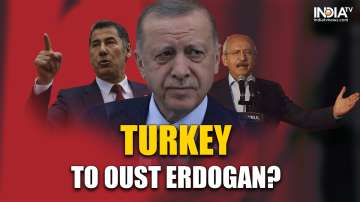Turkey Elections: Early poll predictions show Erdogan leading; Opposition rejects
Opinion surveys have given a slight lead to Kemal Kilicdaroglu, the 74-year-old leader of the centre-left, pro-secular Republican People’s Party, or CHP, and the joint candidate of a united opposition alliance.

Turkey Elections 2023: Early returns from Turkey’s national election Sunday had President Recep Tayyip Erdogan with a solid lead after some 47% of ballot boxes were counted, the Turkish state-run news agency said, while the longtime leader’s main challenger disputed the numbers that showed him trailing.
Erdogan, who has governed Turkey as either prime minister or president for two decades, had 52.2 of the vote from the partial count, compared to 41.9% garnered by opposition leader Kemal Kilicdaroglu, the Anadolu Agency reported.
In the run-up to the election, opinion surveys had indicated the increasingly authoritarian Erdogan narrowly trailed his challenger. The race had appeared to be shaping up as the toughest re-election bid of the Turkish leader’s 20-year rule of his NATO member nation.
With the partial results showing otherwise, members of Kilicdaroglu’s center-left, pro-secular Republican People’s Party, or CHP, disputed Anadolu’s numbers, contending the state-run agency was biased in Erodgan’s favor.
“We are ahead,” tweeted Kilicdaroglu, 74, who ran as the candidate of a six-party opposition alliance.
The election could grant Erdogan, 69, another five-year term or see him unseated by Kilicdaroglu, who campaigned on a promise to return Turkey to a more democratic path and to restore an economy battered by high inflation and currency devaluation.
For the first time in his 20 years in office, opinion polls indicate that the populist Erdogan, 69, is entering a race trailing behind an opponent. Opinion surveys have given a slight lead to Kemal Kilicdaroglu, the 74-year-old leader of the centre-left, pro-secular Republican People’s Party, or CHP, and the joint candidate of a united opposition alliance. If neither candidate receives more than 50% of the votes, the presidential race will be determined in a run-off on May 28.
Over 64 million voters to decide Erdogan's fate
More than 64 million people, including 3.4 million overseas voters, are eligible to vote in the elections, which are taking place the year Turkey marks the centenary of the establishment of the republic.
Voter turnout in Turkey is traditionally strong, showing continued belief in this type of civic participation in a country where freedom of expression and assembly have been suppressed.
Key issues of Turkey
The elections come as the country is wracked by economic turmoil that critics blame on the government’s mishandling of the economy and a steep cost-of-living crisis. Turkey is also reeling from the effects of a powerful earthquake that caused devastation in 11 southern provinces in February, killing more than 50,000 people in unsafe buildings. Erdogan’s government has been criticized for its delayed and stunted response to the disaster as well as the lax implementation of building codes that exacerbated the misery.
Internationally, the elections are being watched closely as a test of a united opposition’s ability to dislodge a leader who has concentrated nearly all powers of the state in his hands. Erdogan has led a divisive election campaign, using state resources and his domineering position over the media, as he has done previously. He has accused the opposition of colluding with “terrorists,” of being “drunkards” and of upholding LGBTQ rights which he says are a threat to traditional family values.
Erdogan's lucrative offers
In a bid to woo voters hit hard by inflation, he has increased wages and pensions and subsidized electricity and gas bills, while showcasing Turkey’s homegrown defence industry and infrastructure projects. He has extended the political alliance of his ruling Justice and Development Party, or AKP, with two nationalist parties to include a small leftist party and two marginal Islamist parties.
Kilicdaroglu’s six-party Nation Alliance, has promised to dismantle an executive presidential system narrowly voted in by a 2017 referendum and return the country to a parliamentary democracy. They have promised to establish the independence of the judiciary and the central bank, institute checks and balances and reverse the democratic backsliding and crackdowns on free speech and dissent under Erdogan.
Will the opposition alliance make any difference?
The alliance includes the nationalist Good Party led by former interior minister Meral Aksener, and two parties that splintered from the AKP and are led by former prime minister Ahmet Davutoglu and former finance minister Ali Babacan, as well as a small Islamist party.
The country’s main Kurdish political party, currently Turkey’s second-largest opposition grouping that the government has targeted with arrests and lawsuits, is supporting Kilicdaroglu in the presidential race. Large crowds gathered outside the polling stations where Erdogan and Kilicdaroglu cast their votes.
“We have all missed democracy so much. We all missed being together,” Kilicdaroglu said after voting at a school in Ankara, where his supporters chanted “President Kilicdaroglu!”
(With inputs from agency)